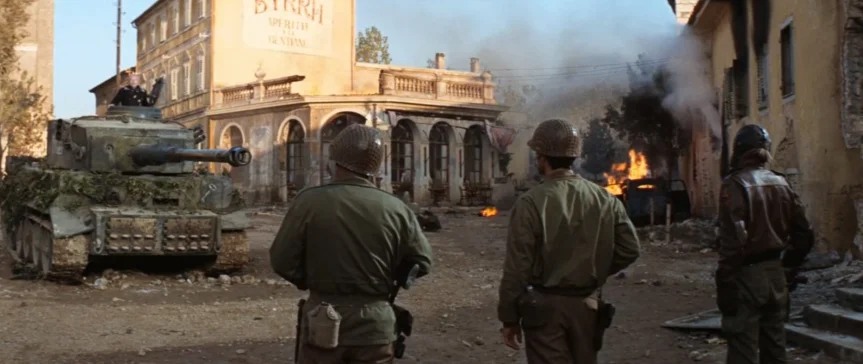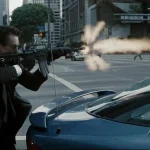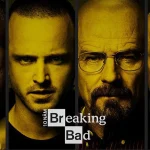Kelly’s Heroes (1970)

“Kelly’s Heroes,” directed by Brian G. Hutton, is a war comedy film set during World War II that offers a unique blend of action, humor, and anti-war sentiment. Released in 1970, the film stands out for its irreverent take on wartime heroics and its exploration of the absurdity of war profiteering amidst the backdrop of conflict.
The plot centers around a ragtag group of American soldiers led by the irrepressible Private Kelly (played by Clint Eastwood). When Kelly learns of a stash of gold bullion hidden behind enemy lines in Nazi-occupied France, he hatches a daring plan to steal the gold for themselves. Motivated by the allure of riches and the promise of a better life after the war, Kelly and his motley crew embark on a misadventure that turns them into unlikely heroes.

At its core, “Kelly’s Heroes” is a satire that subverts traditional war film conventions. Instead of glorifying combat and heroism, the film critiques the absurdity and hypocrisy of war, particularly through its portrayal of soldiers motivated by personal gain rather than patriotic duty. The contrast between the soldiers’ comedic antics and the seriousness of wartime conflict highlights the film’s anti-establishment undertones and its critique of military bureaucracy.
The ensemble cast of characters adds depth and humor to the narrative. Alongside Kelly, the film features memorable performances by Oddball (played by Donald Sutherland), a laid-back and eccentric tank commander; Big Joe (played by Telly Savalas), a tough and pragmatic sergeant; and Crapgame (played by Don Rickles), a cynical supply sergeant with a knack for black-market dealings. Each character brings a distinct personality and skill set to the mission, contributing to both the comedic and dramatic elements of the story.

The film’s narrative unfolds with a series of comedic set pieces and action sequences as Kelly’s platoon navigates enemy territory in pursuit of the gold. Their journey is fraught with challenges, from dodging enemy fire to outsmarting rival German forces also seeking the treasure. These escapades not only showcase the soldiers’ resourcefulness and camaraderie but also underscore the film’s underlying themes of ambition, greed, and the blurred lines between heroism and opportunism.
Director Brian G. Hutton’s direction infuses the film with a playful energy and a distinctive visual style. The sweeping landscapes of Yugoslavia, where much of the film was shot, provide a striking backdrop for the action sequences and add to the film’s sense of adventure and escapism. Hutton’s adept handling of both the film’s comedic and dramatic elements ensures a balance between entertainment and social commentary, making “Kelly’s Heroes” a unique entry in the war film genre.

Beyond its comedic appeal, “Kelly’s Heroes” offers a nuanced exploration of human motivation and morality in wartime. The soldiers’ pursuit of personal gain raises ethical questions about the cost of war and the lengths to which individuals will go to secure their own futures amidst chaos and uncertainty. In this sense, the film serves as a reflection on the universal themes of ambition, loyalty, and the moral ambiguity of wartime decision-making.
In conclusion, “Kelly’s Heroes” is more than just a war comedy; it is a thought-provoking exploration of human nature and the absurdities of conflict. Through its charismatic performances, witty dialogue, and satirical storytelling, the film invites viewers to reconsider conventional notions of heroism and patriotism. “Kelly’s Heroes” remains a timeless classic that continues to entertain audiences with its humor and charm while offering a poignant commentary on the human condition in times of war.

The film’s enduring legacy lies in its ability to blend comedy with social critique, making it a standout example of how cinema can both entertain and provoke meaningful reflection on the complexities of war and human behavior.










